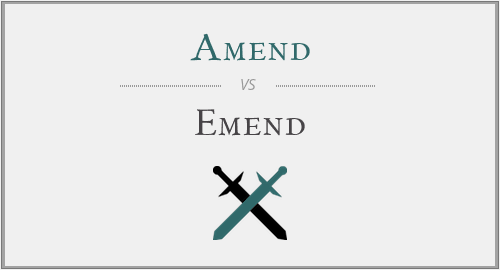You will rarely see "emend" spelled like this, rather than "amend". But you might, and it's important that you know it's not a misspelling, as you may be tempted to think at a first sight, only because you haven't seen it frequently written in this form or because you can't find it in the first dictionary of the most usual English words. "Emend" is not usual, but this doesn't mean it's not a correct word included in the specialty vocabulary of a certain domain.
Not all words that differ through only one letter are wrong or misspelled - some of them are actually officially accepted versions, either because they are older forms, because they are preferred by another English-speaking region, or simply because they are preferred in specialized, professional or formal contexts. Let's see which the case is for "amend" and "emend".
Amend vs. Emend
Both verbs have their origins in Latin, this is the main reason for their spelling similarity. This and, of course, the fact that they actually do have a very similar meaning. What is, then, the difference between "amend" and "emend" and why do they have distinct spellings, after all?
"Amend" is used more frequently, while "emend" is less probable to be found in usual conversations. In fact, you might only find "emend" in formal or official documents between professionals or specialists, because it's a component of technical, specialized vocabulary and it's generally used only in these situations, in professional writing and editing, more exactly; whereas "amend" is more likely to be found in normal communications.
When do we use "amend"?
"Amend" defines the action of slightly changing some words in a document. It is used a lot more frequently than "emend" and it is most likely to be found in passive voice, as in the second example provided below.
Example 1: Please read and amend my declaration, it's important I finish it by this evening. - "amend" refers to slightly changing words in a document.
Example 2: The contract has been amended, terms have slightly changed now. - "amend" will usually be used in passive voice, rather than active voice.
When do we use "emend"?
If you're not a professional editor who specializes in proof-reading, than you'll probably never use or read "emend" in this form. "Emend" is mostly present in contexts related to professional, technical writing and editing, and it defines the action of improving a text through editing.
Example: I hired a professional to emend my contract and make sure everything is alright before presenting it to the other parties. - "emend" is a technical, rare term, used in professional writing and editing.
Conclusion
As you can see, there is no complex philosophy behind "amend" and "emend" and really not much to remember other than the fact that "amend" is used a lot more frequently than "emend" and even though their meanings are very similar, "emend" is preferred in professional, formal language. Anyway, if you are talking about the changes in any official document, we strongly recommend you use "amend" to avoid confusions or doubts that you are misspelling it.





Have a discussion about this article with the community:
Report Comment
We're doing our best to make sure our content is useful, accurate and safe.
If by any chance you spot an inappropriate comment while navigating through our website please use this form to let us know, and we'll take care of it shortly.
Attachment
You need to be logged in to favorite.
Log In